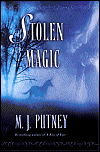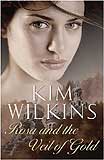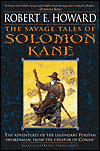
Stolen Magic, by M. J. Putney
Book Review by Susie Hawes
Have you read this book?
Stolen Magic, by Mary Jo Putney, reads more like a regency romance than a fantasy. Although there are magical creatures and a system of magic central to the story, the book is plotted like something from Gorgette Hayer. It's a mixture that might have worked had the author paid a bit more attention to logic, but Stolen Magic has too many holes in the plot for this to work.
The central figures are Meg, a lovely young woman in thrall to an evil wizard, and Falconer, the enforcer for the Guardians, a council of magicians that rule Europe's mages, keeping the peace and, by virtue of this, ensuring that mages neither tear up the world in magical duels nor rule the world as tyrants. The villain, Drayton, stands accused of using magic to influence political events in his country. It turns out he is also stealing magic from young, inexperienced mages and taking it for his own, leaving them mindless and helpless. Falconer sneaks into his castle and the evil Drayton turns Falconer into a unicorn. Enter Meg, a mysterious, simple-minded woman who rescues the unicorn then by accident helps him weaken the shape-changing spell so that Falconer can take his human form. In turn Falconer discovers and breaks the spell that keeps Meg simple-minded. He cannot wholly sever the tie to Drayton, nor can she completely free him of the shape changing-spell. Thus begins an interdependence that grows into a deep and lasting romance.
The characters are well developed, but the magic system in this novel is more like a plot device than a logical method of altering reality. Magic only goes so far, just far enough to advance the story, then stops without any real reason for its limitations. The effects are varied and not truly explored to their logical conclusion. The romance is played out as danger mounts, then suddenly the characters take time out from a major attack to converse, or woo. For instance, during an assault by the enemy on the heroine, they stop and make love. This breaks the enemy's hold over the heroine. The enemy stops attacking, instead of pursuing his advantage with a fresh assault, even though the hero and heroine have not wounded him. They finish a leisurely lovemaking scene, then get dressed and go after him. All this on the enemy's turf.
Magic, logic and tension take a back stage to romance, regency style. We have passion, colorful imagery and strong character development but the book suffers for lack of consequences to the characters as they stumble their way through one dangerous situation after another, thoroughly distracted by one another and their growing feelings of attraction. Twice the hero attacks the villain, walking right into a trap, and twice he gets out again without taking any real damage.
Hopefully the author will spend a bit more time on plotting in her next book. She has obvious talent and writes a very readable tale, with a good eye for the colors of magic and a good feel for the hearts of the central characters, but the tension can't be maintained when there's little sense of danger. The way the characters can slip in and out of trouble and use magic without considering its limits and side effects, and the way this villain takes the passive role, one can't feel there will be any fallout if the hero and heroine make a mistake.
The central figures are Meg, a lovely young woman in thrall to an evil wizard, and Falconer, the enforcer for the Guardians, a council of magicians that rule Europe's mages, keeping the peace and, by virtue of this, ensuring that mages neither tear up the world in magical duels nor rule the world as tyrants. The villain, Drayton, stands accused of using magic to influence political events in his country. It turns out he is also stealing magic from young, inexperienced mages and taking it for his own, leaving them mindless and helpless. Falconer sneaks into his castle and the evil Drayton turns Falconer into a unicorn. Enter Meg, a mysterious, simple-minded woman who rescues the unicorn then by accident helps him weaken the shape-changing spell so that Falconer can take his human form. In turn Falconer discovers and breaks the spell that keeps Meg simple-minded. He cannot wholly sever the tie to Drayton, nor can she completely free him of the shape changing-spell. Thus begins an interdependence that grows into a deep and lasting romance.
The characters are well developed, but the magic system in this novel is more like a plot device than a logical method of altering reality. Magic only goes so far, just far enough to advance the story, then stops without any real reason for its limitations. The effects are varied and not truly explored to their logical conclusion. The romance is played out as danger mounts, then suddenly the characters take time out from a major attack to converse, or woo. For instance, during an assault by the enemy on the heroine, they stop and make love. This breaks the enemy's hold over the heroine. The enemy stops attacking, instead of pursuing his advantage with a fresh assault, even though the hero and heroine have not wounded him. They finish a leisurely lovemaking scene, then get dressed and go after him. All this on the enemy's turf.
Magic, logic and tension take a back stage to romance, regency style. We have passion, colorful imagery and strong character development but the book suffers for lack of consequences to the characters as they stumble their way through one dangerous situation after another, thoroughly distracted by one another and their growing feelings of attraction. Twice the hero attacks the villain, walking right into a trap, and twice he gets out again without taking any real damage.
Hopefully the author will spend a bit more time on plotting in her next book. She has obvious talent and writes a very readable tale, with a good eye for the colors of magic and a good feel for the hearts of the central characters, but the tension can't be maintained when there's little sense of danger. The way the characters can slip in and out of trouble and use magic without considering its limits and side effects, and the way this villain takes the passive role, one can't feel there will be any fallout if the hero and heroine make a mistake.
|
Click here to buy Stolen Magic, by M. J. Putney on Amazon
|
Stolen Magic, by M. J. Putney on Amazon

| More Books You Might Like |
Comment on Stolen Magic, by M. J. Putney
| Comments on Stolen Magic, by M. J. Putney |
| There are no comments on this book. |




